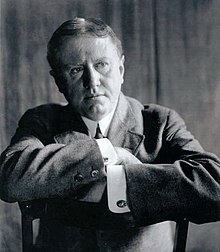(Many thanks to our assistant teacher Camilo Montoya for suggesting this story, perfect for Christmas.)
William Sydney Porter (September 11, 1862 – June 5, 1910), known by his pen name O. Henry, was an American short story writer. His stories are known for their surprise endings.
William Sydney Porter (September 11, 1862 – June 5, 1910), known by his pen name O. Henry, was an American short story writer. His stories are known for their surprise endings.
Porter's most prolific writing period started in 1902, when he moved to
New York City to be near his publishers. While there, he wrote 381 short
stories. He wrote a story a week for over a year for the New York World Sunday Magazine. His wit, characterization, and plot twists were adored by his readers but often panned by critics.
O. Henry's stories frequently have surprise endings. His stories are also known for witty
narration.
Most of O. Henry's stories are set in his own time, the early 20th
century. Many take place in New York City and deal for the most part
with ordinary people: policemen, waitresses, etc.
O. Henry's work is wide-ranging, and his characters can be found
roaming the cattle-lands of Texas, exploring the art of the con-man, or
investigating the tensions of class and wealth in turn-of-the-century
New York. O. Henry had an inimitable hand for isolating some element of
society and describing it with an incredible economy and grace of
language. Some of his best and least-known work is contained in Cabbages and Kings,
a series of stories each of which explores some individual aspect of
life in a paralytically sleepy Central American town, while advancing
some aspect of the larger plot and relating back one to another.
Among his most famous stories is "The Gift of the Magi" we have chosen, and also:
- "The Ransom of Red Chief", in which two men kidnap a boy of ten. The boy turns out to be so bratty and obnoxious that the desperate men ultimately pay the boy's father $250 to take him back.
- "The Cop and the Anthem" about a New York City hobo named Soapy, who sets out to get arrested so that he can be a guest of the city jail instead of sleeping out in the cold winter. Despite efforts at petty theft, vandalism, disorderly conduct, and "mashing" with a young prostitute, Soapy fails to draw the attention of the police. Disconsolate, he pauses in front of a church, where an organ anthem inspires him to clean up his life—and is ironically charged for loitering and sentenced to three months in prison.
- "A Retrieved Reformation", which tells the tale of safecracker Jimmy Valentine, recently freed from prison. He goes to a town bank to case it before he robs it. As he walks to the door, he catches the eye of the banker's beautiful daughter. They immediately fall in love and Valentine decides to give up his criminal career. He moves into the town, taking up the identity of Ralph Spencer, a shoemaker. Just as he is about to leave to deliver his specialized tools to an old associate, a lawman who recognizes him arrives at the bank. Jimmy and his fiancée and her family are at the bank, inspecting a new safe when a child accidentally gets locked inside the airtight vault. Knowing it will seal his fate, Valentine opens the safe to rescue the child. However, much to Valentine's surprise, the lawman denies recognizing him and lets him go.
- "The Duplicity of Hargraves". A short story about a nearly destitute father and daughter's trip to Washington, D.C.
- "The Caballero's Way", in which Porter's most famous character, the Cisco Kid, is introduced. It was first published in 1907 in the July issue of Everybody's Magazine and collected in the book Heart of the West that same year. In later film and TV depictions, the Kid would be portrayed as a dashing adventurer, perhaps skirting the edges of the law, but primarily on the side of the angels. In the original short story, the only story by Porter to feature the character, the Kid is a murderous, ruthless border desperado, whose trail is dogged by a heroic Texas Ranger. The twist ending is, unusually for Porter, tragic.
"The Gift of the Magi" is a short story about a young married couple and how they
deal with the challenge of buying secret Christmas gifts for each other
with very little money. As a sentimental story with a moral lesson about
gift-giving, it has been a popular one for adaptation, especially for
presentation at Christmas time. The plot and its twist ending are well-known, and the ending is generally considered an example of comic irony. It was allegedly written at Pete's Tavern[2] on Irving Place in New York City.
The story was initially published in The New York Sunday World under the title "Gifts of the Magi" on December 10, 1905. It was first published in book form in the O. Henry Anthology The Four Million in April 1906.
(https://en.wikipedia.org/wiki/O._Henry)
